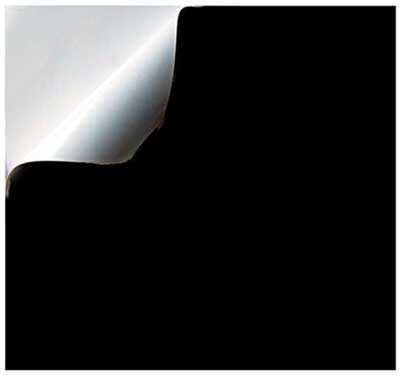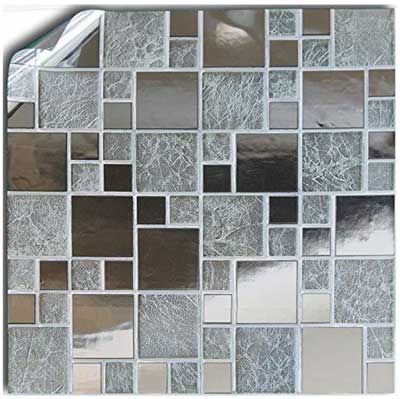How To Clean Grout With A Homemade Grout Cleaner?
Here Is How To Clean Grout With A Homemade Grout Cleaner.
1- Use Baking Powder or Sodium Bicarbonate
2 – Also You Can Use Clear Distilled Vinegar
3 – Hydrogen Peroxide Is An Another Working Well Idea
This article contains advice based on the author’s experiences and cannot be asserted as any more than personal perspective.
See also useful articles:
Tile Covers, Good Or Bad?
How to cover old tiles?
Are Tiles Decals Easy To Remove?
Silver Chrome Tile stickers – Get here
As you know there are lots of places to find hints and tips on how you should clean various items around the home, advising on home-made concoctions or particular proprietary cleaning products you can buy at the supermarkets and hardware stores. In this short book, I’d like to give you more than tips by telling you a bit about the substances most often talked about and used.
Why Grout gets dirty?
Grout is absorbent, one of the things it absorbs best is water, dirty water in particular. So while cleaning with a mop or cloth and water is ok for everyday maintenance, it is not the best solution long term. Every now and again a deep clean with some form of grout cleaner is essential.
Apart from the cheap household remedies, you can also buy specialist grout cleaning products from the supermarket of your choice. While many of these you just spray or wipe on, it is always more beneficial to use a good quality “V” shape stiff angled bristle grout brush to agitate the surface of the grouted areas. This helps to get a more thorough and even coverage plus breaks up any compacted dirt that has probably developed on the surface of the grout.
Can you lighten tile grout with bleach?
While there are many people that use toothbrushes, or similar, to clean their grout with, those that had bought a proper grout cleaning brush all said that they would never go back to using a toothbrush to do the job. Some so-called cleaners, bleach for instance, do not remove the dirt at all. All they do is change the colour of the dirt and kill some of the bacterial build up. Bleach is also a hazardous chemical to use. Both you and your clothes would need to be protected from it splashing and it also needs the room to be well ventilated when using it.
What is the best homemade tile grout cleaner?
Home-made cleaners usually have one or more of just three main ingredients.
- Baking soda, or sodium bicarbonate, which is a neutralising alkaline.
- Distilled vinegar, which is a mild acid.
- Hydrogen peroxide, which is water with added oxygen
These are the ingredients I’ll tell you more about so that you know what you are dealing with rather than just using them because someone says to.
Don’t Need Pro. Grout Cleaners!
Shop bought cleaners are usually a bit more abrasive than those three.
As they are not foodstuffs, they do not have to give a full list of ingredients on their packaging. Often, they are salts and chlorine based and masked with perfumes. Which means, although effective, not so environmentally friendly.
Remember!
Whenever you clean grout with whatever is your choice of cleaner, it is always safer to use household gloves to protect your skin from being over exposed to potentially harmful substances.
Baking Powder or Sodium Bicarbonate???
How this works is as a grinding paste with cleansing properties that are really good at dissolving grease. Just mix it to a paste using water then apply it to your grout with either a sponge, a cloth or your brush. Give it a scrub to break up the hard dirt surface and then wipe off. Wipe over again with a sponge and clean water, then wipe dry with a cloth.
So?
How this works is as a grinding paste with cleansing properties that are really good at dissolving grease. Just mix it to a paste using water then apply it to your grout with either a sponge, a cloth or brush. Give it a scrub to break up the hard dirt surface and then wipe off. Wipe over again with a sponge and clean water, then wipe dry with a cloth.
What is the difference?
There are three differences between baking powder, or baking soda as it’s sometimes called, and sodium bicarbonate.
- Baking power is sodium bicarbonate with a raising agent added, usually cream of tartar. As the name suggests, it’s used mainly in cooking.
- Sodium bicarbonate is not a foodstuff and therefore not manufactured in a ‘food safe’ It’s mostly used as a cleaning agent.
- Just Cheaper – As sodium bicarbonate does not have such exacting manufacturing requirements, it is cheaper to produce and therefore cheaper to buy.
There is no need to buy the more expensive baking powder if you are just using it for cleaning.
Sodium bicarbonate is an alkaline salt. It is a compound made up of bicarbonate ions and sodium ions. Although appearing to be a fine powder, it is actually a white solid crystalline substance.
Tiles Are Getting Smaller
Over time, tiles, sinks, baths and shower bases seem to lose their sparkle.
To get them to shine again just dissolve 100g of sodium bicarbonate into a bucket of warm water. Using a mop or sponge, wipe the areas to be treated. Put a bit of pressure on otherwise the film removing properties will not be as effective. Finally, wipe dry. Everything should now have its sparkle back.
Black Tile Decals

Clear Distilled Vinegar
Although it is a clear liquid, this is often referred to a ‘white vinegar’. There are many types of vinegar available and whole books have been written about what it can be used for. Here, we are primarily concerned with its cleaning and disinfectant qualities.
Maybe Vinegar?
Vinegar is an acid. It’s about 5% to 20% acetic acid to be precise. The other percentage being made up of water and other trace chemicals and flavourings. How it works for cleaning is that it mixes with and breaks up other chemicals and compounds that it is applied to.
For cleaning, it is mixed 50/50 with water and then sprayed on the surfaces to be cleaned. Leave a minute or so to let it activate. The surfaces can then be brushed to help loosen the dirt before being sponged off with clean water and then dried with a cloth or mop.
No!, just Don’t Use VINEGAR!
While vinegar is great for hard surfaces such as tiles, glass and stainless steel, it is not so good as other cleaners when it comes to grout. Grout being porous remember, not hard.
Some home remedies say to use sodium bicarbonate mixed with vinegar. Unfortunately, that does not work well as the alkaline bicarb neutralises the acid in vinegar. So the only cleaning ability the mix has then is as a grinding agent. This will do nothing to help disinfect any germs or kill any bacteria there is.
Apart from the usual ceramic tiles, some properties have marble tiles on their walls and floors. Do NOT use vinegar anywhere near marble. They fight and marble always loses. You can permanently damage marble by using any form of acid cleaner on it.
Chrome Silver Tile Transfers
Hydrogen Peroxide, Is It The One?
Like vinegar, hydrogen peroxide has a multitude of uses around the home. It’s probably best known for being used as a bleach in hairdressing. When it comes to cleaning grout, it is probably the best cleaning agent there is.
For cleaning grout, hydrogen peroxide can be either sprayed or brushed on to both the tiles and the grout. A quick rub over with your brush to help it get into the grout lines and the dirt. Leave it a minute or so to activate then wipe off. Wash down with a damp cloth or sponge and finally rub over with a dry cloth.
Hydrogen peroxide is normally sold as having a 3% concentration of the liquid. This is perfectly safe provided you don’t use it too often and get a build-up of a higher concentration level when it then becomes dangerous.
So Safe:)
As it’s made up of water with an added oxygen element in it, H2O2, it is probably the world’s safest natural disinfectant. The extra oxygen element oxidises micro-bugs to kill them in a sort of controlled burn. When used on any organic materials hydrogen peroxide breaks down into water and oxygen, making it safe.
When used safely, hydrogen peroxide has many health-giving properties. It neutralises toxins, gets rid of germs and kills harmful bacteria. Unfortunately, it kills friendly bacteria too, so it’s not all good news.
There are other unwanted effects too. While it cleans your hands and fingernails wonderfully well, it can dry out both skin and nails. Which is ok occasionally but repeated use can make nails brittle so they break easily. Rubbing olive oil, or coconut oil, into them will help to restore their natural softness.
Many of the proprietary brands of household cleaners contain hydrogen peroxide, so be careful if you use those frequently. Now you find the answer to the question How To Clean Grout With A Homemade Grout Cleaner?
Here you have quality value for money tile stickers 6×6 inch that have that you might like:

